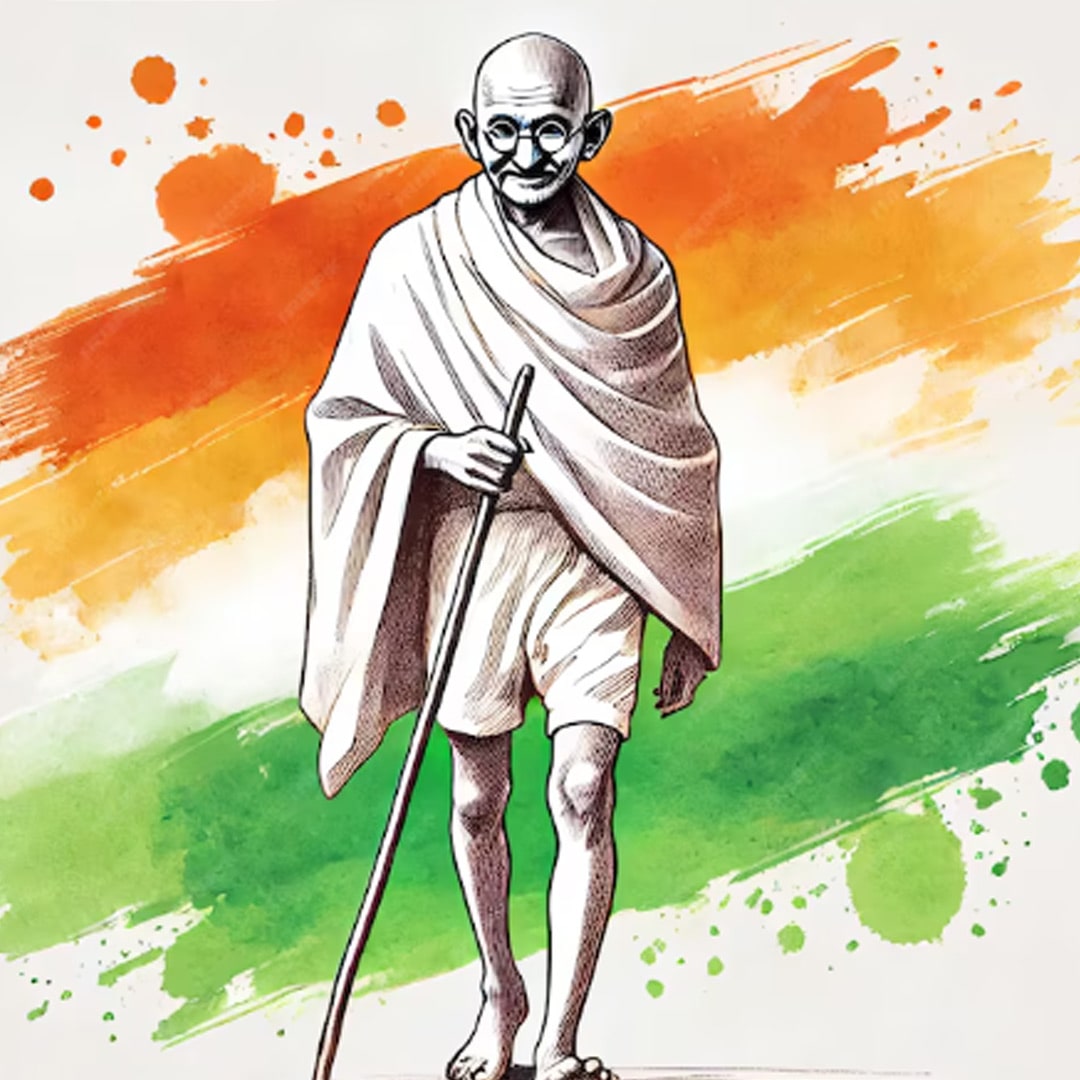Please enter the code we just sent to whatsapp 91-11-46710500 to proceed
Didn't Receive OTP?

English essay on Mahatma Gandhi intended for students and younger readers
Known as the "Father of the Nation" in India, Mahatma Gandhi was a powerful figure in Indian history during the 20th century. Gandhi, who was well-known for his peaceful opposition and dedication to preserving justice and the truth, had an impact that extended well beyond India's borders and provided motivation for civil rights campaigns elsewhere.
Mohandas Karamchand Gandhi, born in the city Porbandar, an Indian coastal region of Gujarat, on October 2, 1869. Gandhi had a strong interest in nonviolence and reality when he was younger; these ideas would eventually become the basis of his philosophy. After completing his studies in felony law in London, he began practicing regulation in South Africa in which he addressed racial inequality by using nonviolent resistance initially.
After arriving back in India in 1915, Gandhi quickly rose to prominence in the struggle for Indian independence from British domination. The Non-Cooperation Movement, the Salt March, and the Quit India Movement were among the significant movements he spearheaded. Mass civil disobedience, nonviolent demonstrations, and a cry for the British to leave India were the defining features of these acts. Gandhi's methods demonstrated the viability of nonviolent resistance and sparked interest in the Indian freedom movement throughout the world.
Principles of Truth and Nonviolence: Ahimsa (nonviolence) and Satyagraha (reality force) are two ideas that were fundamental to Gandhi's ideology. He idea that the most robust weapon available changed into nonviolence. To those who are oppressed of their fight for human rights and justice. Even inside the face of severe brutality and repression by means of the British government, he remained steadfast in his adherence to those standards.
Gandhi advanced as a social reformer similarly to his political engagement. He put in a high-quality deal of attempt to promote equality for all Indians, no matter caste or faith, and to put off social ills like untouchability. Gandhi promoted the usage of nearby items and traditional handicrafts above imported items, and his imaginative and prescient of an unbiased India became based totally on his conviction in simple residing and self-sufficiency.
Despite his assassination on January 30, 1948, Mahatma Gandhi's legacy endures. His teachings and manner of lifestyles have stimulated infinite individuals and acts global, beginning with Martin Luther King Jr.'s civil rights lawsuit inside the United States to Nelson Mandela's war towards South Africa's apartheid regime. Gandhi's undying teachings of nonviolence, peace, and commonplace brotherhood are nevertheless applicable in present day globalized society.
Despite his assassination on January 30, 1948, Mahatma Gandhi's legacy endures. His existence and ideas have prompted many people and global tasks, starting from Nelson Mandela's combat towards apartheid in South Africa to Martin Luther King Jr.'s civil rights movement inside the United States. Gandhi's timeless teachings of nonviolence, peace, and identified brotherhood are nevertheless applicable in contemporary hip global.
1. Born in Porbandar, India, on October 2, 1869, Mahatma Gandhi become a public servant.
2. He labored in South Africa and studied law in London.
3. Gandhi spearheaded India's fight to break unfastened from British domination.
4. He supported civil disobedience and nonviolent resistance.
5. Gandhi spearheaded critical actions inclusive of the Quit India Movement and the Salt March.
6. Gandhi struggled to address social ills together with untouchability.
7. He endorsed self-sufficiency and modest living.
8. Gandhi's ideas of satyagraha and ahimsa stimulated worldwide movement.
9. The assassination happened on January 30, 1948.
10. Gandhi is seemed as a worldwide symbol of peace and the "Father of the Nation" in India.
Read more: The Iron Man of India: Sardar Vallabhbhai Patel
1. Born Mohandas Karamchand Gandhi, Mahatma Gandhi rose to prominence as a frontrunner and social reformer.
2. Having been born in Porbandar, Gujarat, on October 2, 1869, he became raised with sturdy moral principles.
3. While pursuing his legal studies in London, he become introduced to Western conceptions of justice and rights.
4. Gandhi in my view encountered racial discrimination at the same time as working as a regulator in South Africa.
5. As a end result, he developed the principles of civil disobedience and nonviolent resistance.
6. After arriving again in India in 1915, he advanced into a significant role in the fight for independence.
7. Gandhi's management of the Non-Cooperation Movement signaled the give up of a giant bankruptcy of the war.
8. The 1930 Salt March turned into a crucial act of resistance against the British salt levy.
9. Gandhi's 1942 Quit India Movement called for an give up to British rule.
10. He highlighted nonviolence as a effective buying and selling weapon in his Ahimsa ideology.
11. "Fact pressure," or satyagraha, have become Gandhi's approach of nonviolent protest.
12. He worked nonstop to enhance the lives of the underprivileged and marginalized.
13. Gandhi encouraged for social equality by means of preventing towards untouchability.
14. He encouraged using hand-spun textile known as "khadi" to assist self-reliance.
15. Gandhi's intention went beyond racial and non secular variations to encompass a unfastened and united India.
16. His willpower did no longer waver inside the face of brutality and prison.
17. Global leaders like Nelson Mandela and Martin Luther King Jr. were inspired by his teachings.
18. Gandhi was murdered on January 30, 1948, but his influence lives on.
19. He is renowned for having a significant impact on both international peace and India's liberation.
20. Gandhi's life serves for example of the strength of fact, love, and nonviolence in bringing about long-lasting alternate.
Shape Your Kid's Future with Bambinos Classes | Bambinos.live India's No. 1 English Communication Platform For Kids | Click here to Book a Free Class Limited time offer.